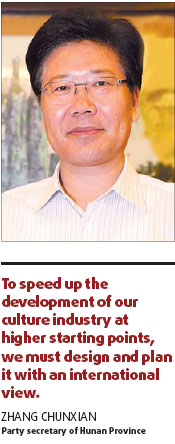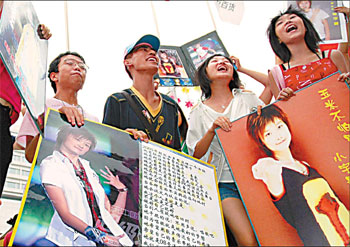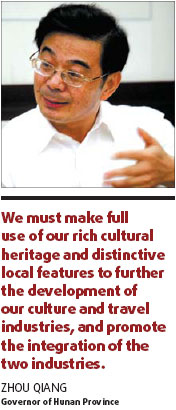
While talking about competition in China's television broadcasting industry, Wei Wenbin speaks from the point of view of someone driving a brand-new sports car. "If you drive a rickety car, you cannot get into the fast lane. You'd be kicked out if you do," says the chief of Hunan Broadcasting and Television Bureau.
Hunan Satellite Television (HST), the flagship operation under his tutelage, has been in the top three of all television channels in the country in terms of annual revenue, behind only CCTV1 and CCTV5.
That puts HST, with one billion-plus yuan ($131 million-plus) in revenue last year, in the national league, way ahead of other province-level operations. If this sounds too quantitative, just mention Supergirls or Superboys, the hit contest shows, and you'll understand the clout Wei and his "Hunanese army" have over the nation's cultural consciousness.
However, the seeds for Hunan's spectacular success were planted a dozen years before the nation was caught in the maelstrom of audience-participation programming when Hunan launched its Supergirls on its satellite channel in 2005.
"I cannot deny that we had some good luck," says Wei, who assumed the post of bureau chief in 1993. Around that time, it bought 200 hectares in what was then a suburban farmland. "Nobody can afford such a big plot now. It would cost tens of billions." After a decade of build-up, Hunan now has the biggest and most advanced television production facility in the nation.
But a lavish studio does not guarantee a first-rate show. That's where Hunan really stands out. Since the second half of the 1990s, Hunan has consistently produced entertainment programming with ratings that soared and formats that set industry standards. Wei believes that content is king. "You can't just have smoke and mirrors. You'll have to deliver."
|

Supergirl icon Li Yuchun's fans gather in front of HST's studio to wait for their idol. Wu Peng
|
He also believes in innovation. Whenever Hunan runs a huge hit, he would inject a dose of crisis into the heads of his top brass. "Never get carried away by a hit show. It is easy to deal with a victor because he tends to be conceited and defenseless."
During one meeting, he gave them a list of brands that few of them could identify. "These were top electronics makers in 1980s' China. They all vanished without a trace, replaced by newer, more innovative enterprises," he warned, at a time when Supergirls alone was raking in as much money as a typical province-level station could make in a whole year.
Wei does not deny that most of his hit shows are modeled on overseas creations, for example, Supergirls on American Idol, Transformation on Wife Swap, etc. "China has an older civilization than most Western countries, but we'll have to admit that their history of television production is longer than ours. We have to learn from them."
But Wei cautions that learning is not copying, but marrying two contradictory elements. "Don't laugh at such practices. Some of us eat bread with chili sauce. Localizing a foreign show takes a lot of skill. Whoever can successfully combine East and West, old tradition and modern needs, will come out a winner."

"China has entered the era of blockbusters," adds Wei. Besides mega-budget movies, television shows have also created cultural phenomena around a few hit shows. "We have a blockbuster office here, which explores all fields of culture and entertainment for the next big thing."
Some of Hunan's shows, especially Supergirls, have incurred a backlash as critics blamed them for "amusing the public to death," "lowering aesthetic standards," among other sins.
To that, Wei responds: "We know where the bottom line is. We must be responsible for the interests of the Party, the nation and the people. This is a line we never cross." He cites the show Transformation, where kids from urban and rural families trade places for a set period of time, as the prime example of responsible entertainment. Actually, this reality show is produced by the news department. "It touches on many of the key issues of our society, such as urban-rural gap and youth education, and has a very positive impact," notes Wei.
Wei attributes Hunan television's success to "unwavering support" from the province's political leaders. "We have leaders with vision and the political and cultural upbringing to go with it. They see our cultural business not only in the context of the whole province, but that of the whole country and the whole world. From this higher vista, they consider the cultural ecology and propose to build a culture-strong province."
Wei says that the current leaders use "Enrich our people and strengthen our province" as their motto. "They utter it some 5,000 times a year," he maintains. And "strength" encompasses economy, culture and education. For a province whose economy still lags behind many others, its achievement in culture and entertainment is especially outstanding.
|

Children perform traditional lion dance at a local cultural festival held in Changsha. File Photo
|
Wei believes that the risk-taking spirit of the "Hunanese army", nicknamed after the daredevil military fighters of previous generations, is something in the genes. "I have never left Hunan in the past few decades. This is where I nurture myself. Hunan culture can be boiled down to this phrase - 'With the whole world in your heart, and act before others have the courage'. The first part is about having a broad mind, and the second about taking action."
This is in a country where the prevailing belief is "the early birds get the bullet." No wonder, Wei and his comrades are racing forward in the fast lane and building a television empire like no other. Like the mammoth structures in northeastern Changsha, capital of Hunan Province, the industry helmed by Wei is something of a marvel - always one step ahead of time, yet acutely attuned with the national mentality.
(China Daily 10/17/2007 page21)
